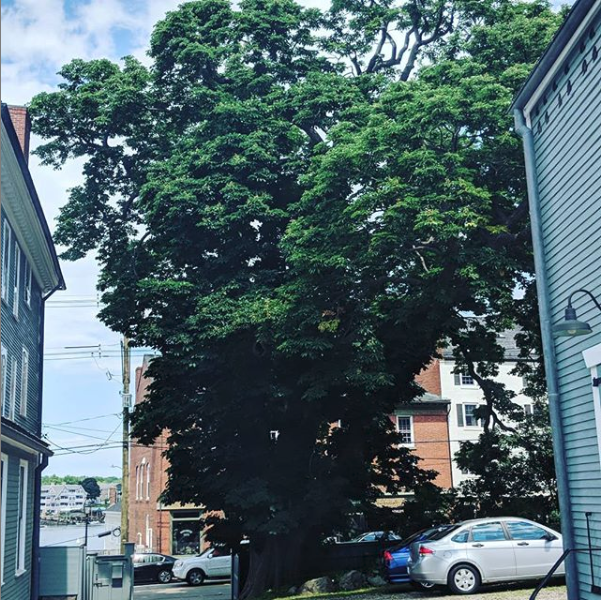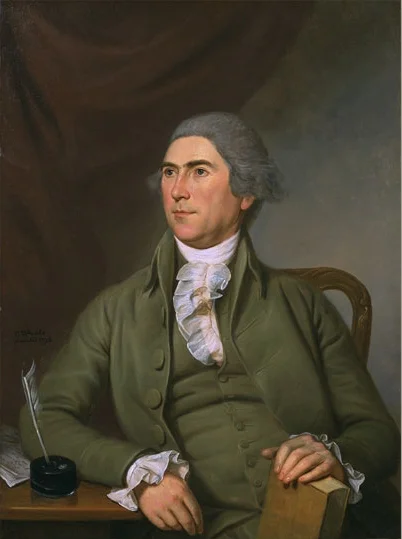Prince Whipple Plants A Liberty Tree
I have been trying to write an article about Prince Whipple for a very long time. In fact, when I first began drafting biographies for this website, Prince was one of the first I attempted to complete.
However, this essay was written and rewritten several times as I found myself dancing around the idea that Prince Whipple, as a slave, was lucky to be purchased by William Whipple. I say this because most slaves ended up in much harsher conditions with much harsher masters.
Please note, Whipple’s ‘luck’ should not be taken as justification. Prince was a slave and therefore his life was not easy. Slavery is wrong and the ‘luck’ I speak of is in comparison to his contemporaries in bondage.
Prince Whipple
Is it possible to say a child who was taken prisoner and sold into slavery could be lucky?
Well, no. I suppose that would be foolish.
However, one boy, known to history by his Americanized name, Prince Whipple, received just a bit of luck, whether he knew it or not.
Prince had been sent by his West African parents to study in the New World, just as his brother had. His plans were ruined, however, when the captain of his ship decided not to honor the task he was paid to do and instead brought the young man to American and sold him as a slave.
The dose of good fortune Prince received was in who it was that purchased him. Standing on the auction block, chances were good that he’d be bought and sent to work on a southern plantation. Luckily, he was selected by William Whipple and brought to Portsmouth, New Hampshire.
Slavery in New England
New Hampshire in the late 18th century had some of the most progressive views toward slavery in the British colonies.
Those in bondage were generally called servants instead of slaves. Most houses had one or two slaves and they worked alongside their owners, as opposed to other colonies where the work was done entirely by those in captivity. Additionally, slaves in New England were viewed much in the same way as women, a member of the family, but one who needed to be cared for like a child.
Does this justify the ownership of another human being? Of course not.
Does it make Prince Whipple’s fate significantly more fortunate than it could have been? Absolutely.
We can see this by diving deeper into the life which followed.
The Liberty Tree
Prince assisted William in running his house and merchant business.
When William was sent to the Continental Congress, Prince joined him. Though he was not in the room when William signed the Declaration of Independence, Prince certainly heard the glories of liberty spoken in the coffee houses and inns of Philadelphia.
In fact, when the two men returned to Portsmouth, they planted a liberty tree together (which, almost 250 years later, still stands (and is pictured above)).
Later when William served as a General at the Battle of Saratoga, Prince joined him in the fight for freedom.
Petitioning for Freedom
The following year, a group of twenty slaves sent a petition to the State of New Hampshire requesting manumission. The document is telling as it was clearly written by someone who understood the ideas of liberty which were being discussed up and down the eastern coast of North America. It is highly likely Prince was the author of the paper, although there is no way to verify this.
While the New Hampshire Assembly never made a decision on the petition (due to the duel distractions of the war and building a new government), the fact that it was submitted at all speaks to the attitude of Portsmouth citizens toward their servants.
Slaves in other States would never submit petitions of this nature due to the fear of reprisal from their masters, not to mention the widespread illiteracy.
Rights of a Freeman
The reason I discussed Prince’s unfortunate situation holding a hint of luck is that his owner, William, permitted him to petition for his freedom.
Additionally, when Prince was married two years later, William’s gift was the ‘rights of a freeman.’
This did not make Prince free, it just gave him most of the rights that any non-landowning man would have. Frankly, this may have been considered safer than total manumission because people would be more hesitant to kidnap him for resale in the South if he was the property of a white man.
Freedom
Another three years would pass before the Treaty of Paris was signed and the United States was recognized as independent. Shortly thereafter, William gave Prince his full freedom.
What did Prince do after being liberated from bondage? He continued to work for William.
Despite how their relationship began, these two men had lived in the same house for over a decade. They had grown close.
They had become family.
If you’d like to learn more about Black Patriots of the American Revolution, check out our articles on James Armistead Lafayette and Gabriel’s Rebellion.
To read further on the experience of black people during the Founding Period, I recommend ‘Black Americans in the Revolutionary Era’ which can be read through the affiliate link below.
If you like this site, make sure you subscribe to the email list for a new Founder every day.






